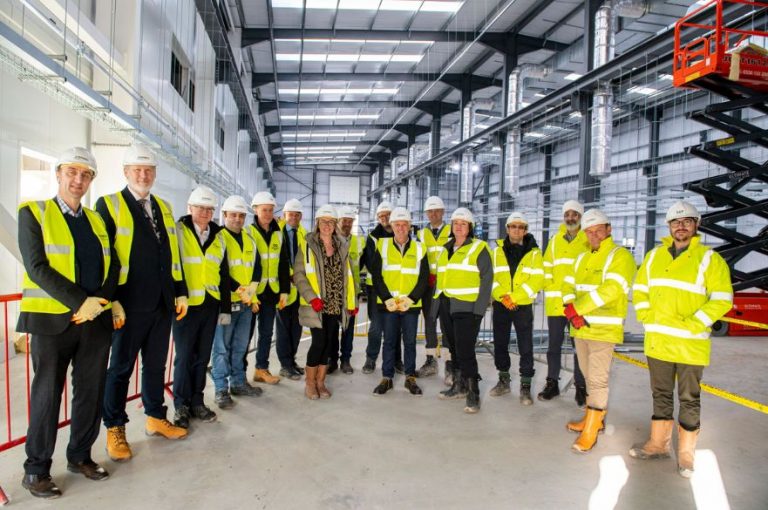Wednesday, November 5, 2025
Niche Nottingham immigration law firm, Paragon Law has promoted two senior colleagues to directors.
James Firman has been promoted to operations director. Firman joined the organisation over 15 years ago, initially joining as a general administration apprentice and since then has worked in finance, general operations, IT and HR. In 2021, he was named as Nottinghamshire Law Society’s Practice Manager of the Year.
Senior solicitor Emma Okenyi has been promoted to a legal director. In September, Okenyi celebrated her tenth year with Paragon Law and in the same month she also became head of the firm’s Personal and Family immigration team.
James Firman said: “Having joined Paragon Law after my A Levels I have grown around the business for all my working life. I have gone from helping stamp envelopes to managing Paragon Law through difficult periods such as covid and major IT projects giving us the capability to work remotely for our clients. I enjoy the challenges that my work presents and the entrepreneurial environment.”
Emma Okenyi said: “I initially came to the UK as an international student from Kenya to study law at the University of Hull and I subsequently qualified as a solicitor at Paragon Law. I have enjoyed the opportunities that have been presented to me and now particularly enjoy training and developing new lawyers that join my team.”
Founder and director Thal Vasishta said: “These promotions reflect the hard work, dedication, and talent shown by these individuals. Both James Firman and Emma Okenyi have been at Paragon Law for over 10 years and have since established themselves as amongst the best at what they do.
“Paragon Law continues to demonstrate our commitment to diversity and inclusion. Emma is an example to all international graduates in the UK that you can reach the top of your field of work. 67% of our senior leadership are women and 67% are from a BAME background.”
This Sunday, 13 November 2022, Tim Hayden, CEO of Hagley West Watches, will be attempting to set his new record for the most watch sales in a day on social media, during a six-hour livestream on TikTok.
The challenge comes as part of the build-up to Hagley West’s Black Friday extravaganza which will include the launch of a new limited edition purple collection. Based in Hertfordshire, with UK distribution handled in Northamptonshire, the company is growing rapidly thanks to TikTok.
Taking place from 6:45pm GMT on Sunday, the latest Tik Tok livestream will see Hayden and Hagley West attempt to reach 1,000 watch sales in a single day. Viewers will be able to tune in and see Hayden attempt to double his record daily sales, just using TikTok.
Hagley West’s Black Friday promotion will offer customers 20-50% off a variety of watch ranges, with a further 10% discount available for those who join the stream. The offers will run for the remainder of November and will see a series of other live streams planned from different places in the world, with Hayden also offering free products to those who participate in his famous ‘Find Tim’ challenges.
When discussing this weekend’s event, Tim Hayden explained: “We’re really excited about this Black Friday challenge. Over the last few years, we have watched Hagley West grow and we’ve made sure that we challenge ourselves by setting goals to keep us motivated. Last year we were able to sell more than 500 watches in a single day, and this year we want to double that.
“We’re going to have a lot of fun on the livestream and it’s going to be a great opportunity to interact with our followers. The new collection really is something special and we can’t wait to see them on the wrists of people across the world.
“Social media has allowed us to turn the business into something we could never have dreamed of. This has been because of the support from our followers and customers and now we want to give something back to them with this exclusive sale we’re running till the end of the month.”
For more information on Hagley West, visit www.hagleywest.com. Alternatively, follow founder, Tim Hayden on TikTok @timhayden6 to see how he gets on with his Black Friday challenge.
Over the past year, we have heard about the success of working from home during and after the pandemic. A survey conducted by Hubble HQ to find out if people should ditch the office found that an overwhelming majority of people had a positive experience doing so. An even bigger percentage said they would like to continue working from home even if it is just one day a week. While these are compelling results, one cannot help but wonder if there is more to uncover. In this article, we look at what between the office and the commute drives people to prefer working from home.
Synectics, a Sheffield-based leader in the design, integration and support of advanced security and surveillance systems, has revealed the conditional sale of the business of SSS Management Services Limited, which is a trading entity of its Nottingham-based Synectics Security division, for cash consideration of up to £0.2 million to Parfas Limited.
The transaction is subject to certain closing conditions and is expected to be completed on or before the company’s financial year end on 30 November 2022.
SSS provides monitoring and managed services, principally to multi-site retailers in the UK. These activities are considered by the Board to be non-core and are not part of the company’s growth plan. The sale of the business will allow the company to focus on the growth of its core business and allow SSS to prosper under private ownership.
The consideration comprises an initial cash payment on completion of £0.1 million with the balance, conditional on the profitability of SSS post-sale, payable following the first anniversary of completion. The proceeds will be used for general corporate purposes.
In the company’s last financial year ended 30 November 2021, the SSS business generated audited revenues of approximately £7 million and an operating profit of less than £0.1 million and, as at 30 November 2021, had audited net liabilities of approximately £1.6 million.
Paul Webb, CEO of Synectics plc, said: “SSS Management Services is a unique business with a very strong management team that will thrive under private ownership.”
Stacey Anderson, Managing Director of SSS, added: “While our long-established business has been part of Synectics for some time, we believe that we can serve our customers better as an independent privately owned business remaining true to our core values of providing the very best levels of service, independent of service providers.”
The planning application for a new market hall, a cinema and other leisure facilities at the Western end of Freshney Place have now been submitted into the planning system.
This is another opportunity for people to have their say on the scheme before it is considered by the Planning Committee in the months ahead, and is the time when statutory authorities can also submit their detailed comments.
As previously reported, the council has won significant grant monies for the transformation of the western end of Freshney Place, which it bought during the summer. The proposed leisure development will house a new cinema, with local and regional operator Parkway Entertainment Group coming in as an anchor tenant and pledging to provide a great venue to complement its offer in Cleethorpes.
The plans will also feature a remodelled entrance to the centre, which will be lined with units for leisure and eateries, and an entrance to a new and transformed Market Hall.
Prior to submission, public drop in sessions were held by the project team to inform residents and businesses what the scheme might look like if approved, as well as talking through the timescales for the various phases of the development.
During the consultation, the main issues highlighted by visitors included the leisure use of the area, parking once the improvements have been made, and the design, look and feel of the planned new buildings.
Alongside the plans for the Freshney Place development, North East Lincolnshire Council has launched a new project aiming to improve the town centre street scene. Focused on the Victoria Street West pedestrian precinct and surrounding streets, officers are encouraging owners of a relatively small number of street-facing properties to make improvements. They are writing to the owners of properties and advising them on the works needed to bring their buildings to an acceptable standard.
Work is also progressing on the Riverhead scheme, with the plans being put forward for approval by the Council’s Cabinet at the meeting next month. These plans do not require planning permission as it is permitted development on public land. If approved, work is expected to start in the early new year.
Cllr Philip Jackson, leader of the Council, said: “We have said all along that we are working to improve our town centres, to make them more attractive for people to live and work in. We have already seen the improvements to Garth Lane and St James’ Square completed, and now we’re working hard to deliver other elements of the Grimsby masterplan, as well examining opportunities to use empty spaces differently.”
The UK economy shrank by 0.2 per cent in the third quarter of 2022, setting Britain on course for the quickest return to recession since 1975 and offering sobering backdrop to the Autumn Statement next week, the Resolution Foundation said today (Friday).
While a smaller fall than markets expected, the latest contraction was widespread, with consumer spending shrinking amidst an acute cost-of-living.
Should the UK slide into recession next quarter it would be the quickest return to recession since 1975, with the UK only coming out of its last recession eight quarters ago (in Q2 2020).
The UK’s performance was weaker than all other G7 economies (though data for Japan has not yet been published).
James Smith, research director at the Resolution Foundation, said: “Falling consumer spending has caused the economy to shrink in the third quarter of 2022. This has set Britain on course for the quickest return to recession in nearly half a century.
“These latest figures provide a sobering backdrop to the Autumn Statement next week. The Chancellor will need to strike a balance between putting the public finances on a sustainable footing, without making the cost-of-living crisis even worse, or hitting already stretched public services.”
A Leicester logistics specialist is celebrating after winning an award for innovation from a leading industry body.
Translink Express Logistics Ltd won the coveted Contribution to Innovation award at the Institute of Supply Chain Management’s (IoSCM) annual Supply Chain Awards.
The Narborough-based firm was celebrated for overcoming major industry challenges with innovative initiatives and thinking outside the box to introduce business improvements.
As key workers during the pandemic, its team helped deliver essential goods to local supermarkets, after transforming its warehouse into a fully functional distribution centre in under two weeks.
Translink, which is a family-owned business and a member of the Pallet-Track network, also worked closely with Blaby District Council on its ‘Blaby District Let’s Talk Logistics’ scheme.
The initiative was launched during the 2021 HGV driver shortage to boost recruitment across the supply chain and raise the profile of careers in logistics.
Commercial and finance directors, Chris and Debbie Hobbis, collected the award during a ceremony at The Copthorne Hotel in Newcastle.
The IoSCM provides globally-recognised qualifications and training to raise the standards of supply chain networks worldwide.
The firm’s quality and compliance manager, Heidi Edwards, entered the firm for the award.
She said: “It’s the first quality award for our business and valuable recognition from a respected, professional body.
“The projects were very much a team effort but Chris, in particular, deserves the recognition as it was his leadership and contribution which secured the project that kept us busy throughout that time.
“He spearheaded change in the business, as he was determined to keep it fully operational and to keep the team feeling confident and motivated through the obstacles of the pandemic and the HGV driver shortage.
“It was Chris’s determination and vision that helped the business to thrive by putting new cost-saving systems in place and kitting out what was a basic storage warehouse into a pick and pack facility, which has also created new jobs and increased our team to over 90 members of staff in total.
“We never expected to win because compared to the competition we’re a small depot in the Midlands, but I’m so proud of us for winning.”
Translink’s first award win comes at the end of its 35th year in business.
Chris said: “Like everyone in the industry, it has been a really challenging period for us, with lots of ups and downs, but we have had a great 35th year; our entire team has worked so hard to ensure that we continue to deliver excellence within our sector for both our customers and our partner members in Pallet-Track.
“This is truly an award-winning year, made possible because of our entire team spirit, no one person is ever responsible for a company’s success and we would like to say a great big thank you to our entire team for all the effort and support they continue to show.
“Just to be nominated as finalists in the IoSCM Supply Chain Awards was absolutely amazing, so it is a very proud moment for the entire team to share.”
Caroline Green, chief executive of Pallet-Track, said: “As a network, we are thrilled for the team at Translink Express as they have worked incredibly hard under difficult circumstances to pivot their services and overcome the challenges of recent years.
“We are all so pleased to see the team receive the recognition that they deserve.”
Fiona Duncan-Steer, founder of RSViP Business Networking Agency, discusses the importance and the many different forms of communication.
I was recently asked to deliver both a keynote and a workshop around communication for a large organisation and one of the main topics of discussion fell around how we currently communicate with our audiences.
I asked the question: “How do you currently communicate with your audience?” From there a discussion evolved surrounding the various forms of communication used within various sectors and job roles, leading to the differentiation of those said forms of communications and platforms, finalising with what people’s preferences were and why.
Many spoke about email being the main way they communicate, whereby messaging can often be misconstrued or mistranslated compared to being in the room with someone, having a face-to-face conversation, or even by telephone.
This then led to the interesting notion and realisation in some cases that communication isn’t just about the words that we speak, but a whole host of other things such as body language, including mannerisms, handshakes, body positioning, eye contact, facial expression, and hand gestures amongst others. Email also removes the detail that we get from verbal expression, such as linguistics and speech patterns, not to mention story content, and if we really delve in deep, we can look at other forms such as self-comforting gestures, how to spot a liar and the power behind a smile.
Knowing how to read people in this way certainly helps you to be able to diagnose issues that are apparent with perhaps a client or staff member who is struggling but not being honest, or to identify a team member who is facing a challenge or to assist when in negotiations in business.
Being equipped with the tools you need to not only help you to communicate better, but to read other people when they are communicating is a fast track to getting ahead in not only business but in life and could save you a lot of stress and heart ache in the long run in many scenarios.
Now I’m not against communication by email or text, in fact I use it daily and it has its place – it’s quick, convenient, and easy. However, for something like for example, a coaching session, one to one with a staff/team member, or business discussion, I would always advise taking it offline and giving yourself and the other person the opportunity to use communication in all its forms. This could not only save time in the long-run, but also help to prevent any ‘mis-communication’, and you never know, this could lead to a discussion or confession that you least expected, but that in turn helps you to move the situation forward in a positive way.
My two hour interactive workshops cover three key areas of communication including: ‘Communication in all its forms’, as discussed in this article, ‘Language’, which will see us discuss the relevance of understanding both verbal and body language within your career, which will give you the transferable skills to help overcome and manage stressful and challenging situations. The final segment delves into ‘The art of conversation’, and through a simple visualisation tool we will look at how you can become the perfect conversationalist, touching on the relevance of small talk, creative questioning, and more.
Investing time in bettering your communication will result in nothing but positive outcomes for you and those you encounter in life and business, just think how many world problems could have been solved by now with better communication, but it’s not too late – it all starts with ourselves.
Fiona Duncan-Steer, RSViP
www.rsvipnetwork.co.uk www.fionaduncansteer.com
See this article in the November edition of East Midlands Business Link Magazine here.
Initial construction has completed on a new industrial research facility to help manufacturers across the Midlands win work in growing low-carbon markets and develop new sustainable technologies.
Senior figures from the Nuclear Advanced Manufacturing Research Centre (Nuclear AMRC) and partners visited the site at Infinity Park Derby to mark the topping out of the £20 million building.
The new Nuclear AMRC Midlands facility will provide a permanent base in Derby for the University of Sheffield’s Nuclear AMRC, part of the UK’s High Value Manufacturing Catapult, and a new home for the University of Derby’s Institute for Innovation in Sustainable Engineering (IISE).
Andrew Storer, CEO of the Nuclear AMRC, said: “It’s fantastic to see the progress that’s been made on our new facility, especially when the UN climate change conference in Egypt is again highlighting the urgency of reducing emissions from all parts of the global economy. As a nation, we need to build a new generation of low-carbon power plant, and we need to move industry to more sustainable manufacturing and engineering practices.
“The research that will be carried out in this facility will help tackle both of those challenges, and support manufacturers in Derby and beyond to seize the opportunities of the energy transition. I look forward to working with local industry, academic and government partners to deliver sustainable growth in the Midlands for generations to come.”
The pilot Nuclear AMRC Midlands opened in 2019 in the iHub on Infinity Park (now the home of the Nuclear Skills Academy led by Rolls-Royce and the University of Derby).
“Our pilot centre at iHub was a great success, and has helped start the snowball effect of creating a real community for industry and innovation at Infinity Park,” Storer added. “Along with our role in securing the Nuclear Skills Academy on the park, I am really proud of the role the Nuclear AMRC is playing to develop long-lasting support for the supply chain in the Midlands.”
The new 4,300m2 facility will build on its work by expanding the centre’s capabilities in technology areas to help UK manufacturers win work in the nuclear supply chain.
While the Nuclear AMRC’s original facility in South Yorkshire focuses on mechanical manufacturing processes for power plant components, Nuclear AMRC Midlands specialises in emerging technology areas including digital engineering, control and instrumentation systems, and additive manufacturing.
The new building, designed by Stephen George + Partners and built by Stepnell, is based around a large open-plan workshop which will host a flexible range of state-of-the-art manufacturing and research equipment, with ten metre ceilings and 50 tonne cranes to allow work on large fabrications and assemblies.
Nuclear AMRC laboratory facilities will include dedicated space for 3D printing and rapid prototyping, virtual reality and visualisation, and equipment qualification. The building will also include dedicated space for engaging with local schools and colleges, to help encourage young people to consider careers in science and engineering.
The University of Derby’s IISE will occupy around a quarter of the building. IISE specialises in developing sustainable life-cycle design and manufacturing processes for products, serving a range of sectors from transport to healthcare to help reduce their environmental impact. IISE offers collaborative innovation and research using a range of equipment for design, manufacture and testing, supported by specialist expertise to include advanced manufacturing, computational modelling of materials and structures, life cycle management and data science.
Professor Warren Manning, Provost for Innovation and Research at the University of Derby, said: “The development of the Nuclear AMRC Midlands facility at Infinity Park builds on Derby’s longstanding heritage linked to the nuclear industry and cements further its reputation as a city at the cutting edge of industrial innovation.
“We are delighted that the University’s Institute for Innovation in Sustainable Engineering will be co-located with the Nuclear AMRC, offering huge collaboration potential for organisations to work together to develop the skills and capability required to support government objectives linked to net zero and manufacturing growth, and strengthening the wider D2N2 region’s position as a key advanced manufacturing and innovation hub for the UK and beyond.”
As befits a building dedicated to low-carbon technology development, the Nuclear AMRC Midlands has been designed to high standards of environmental sustainability and is targeting a BREAAM rating of Very Good and EPC B rating.
The facility features 590m² of roof-mounted solar panels, generating around 83MWh of low-carbon energy a year – with estimated emissions savings of more than 19 tons of CO2 compared with the average grid supply. The building includes sustainable materials throughout including cladding, insulation and glazing, with site landscaping to increase biodiversity and green cover.
Tom Sewell, regional director at Stepnell, said: “The Nuclear AMRC facility in Derby is a fantastic project that we are proud to be working on. Stepnell is committed to investing in the local community and is on track to deliver over £3m of social return on investment. Key activities have included employing a local supply chain, working with people facing significant barriers to employment through Derby City Council led initiatives, and collaborating with local education providers including Derby College, University of Derby, City of Derby Academy and Landau Forte College.”
Chris Webster, studio director for Stephen George + Partners and lead architect for the project, said: “It was exciting to design a building that had to deliver on both the requirements of Nuclear AMRC and be a statement gateway to the development. We were able to use our extensive experience in the sector to create this quality design, reflecting the high technology aspirations for Infinity Park Derby.”
Infinity Park Derby is a unique collaboration between Derby City Council, The Harpur Crewe Estate, Rolls-Royce, the D2N2 local enterprise partnership, and developers IPD LLP which comprises Wilson Bowden and Peveril Securities.
Nick Richardson, Managing Director of Wilson Bowden, said: “The topping out of the Nuclear AMRC facility is another significant milestone in the delivery of this exciting advanced manufacturing and logistics project and further cements Derby’s unrivalled reputation for world-class manufacturing.
“The Park is already benefiting from a superb location with excellent access to the major routes such as the M1 and A38, this will be further improved with the opening of the proposed new junction off the A50 offering even more direct access to the national motorway network, reinforcing Infinity Park’s position as the premier location for logistics and manufacturing businesses in the region.”
Spanning 100 acres, Infinity Park offers design and build opportunities of up to 50,000m2 for logistics and manufacturing facilities. It is located next to Rolls-Royce and within 20 minutes drive of global manufacturers including Toyota, Alstom and JCB.
With an initial cost of around £20 million, the Nuclear AMRC Midlands building is supported by Derby City Council, and part-funded by £9 million from D2N2.
Councillor Steve Hassall, cabinet member for regeneration, decarbonisation, strategic planning & transport at Derby City Council, said: “It’s great that we’ve been able to visit the site of the new Nuclear AMRC to mark this key milestone. This state-of-the-art facility is a great example of partnership working in action and will offer a huge boost to our local economy and reaffirm our place as a national leader for innovation, manufacturing, and world-class research and development.”
Frank Horsley, head of business & innovation at D2N2, said: “The Nuclear AMRC is a significant opportunity to establish and develop a sustainable net-zero supply chain in our region.”
Nuclear AMRC Midlands will support at least 35 collaborative research and development projects within its first five years, drawing on public and private investment to tackle industry challenges in locally-important sectors such as aerospace, automotive and rail as well as low-carbon energy technologies.
The team will also work with at least 50 smaller companies in the Derbyshire and Nottinghamshire area, to help them develop their capabilities for new market opportunities through supplier development programmes such as the flagship Fit For Nuclear service.
Around 30 researchers, engineers and support staff will work at the new facility when it opens in spring 2023, growing to at least 70 within five years.
Work has started on Ashfield District Council’s largest housing development to date on Warwick Close in Kirkby, which will see 34 new affordable family homes being built.
In total 18 two bedroom and 16 three-bedroom family homes will be built, with work scheduled to be completed by the winter of 2023. The homes, that will be let to applicants on the Council’s Housing Register, will include the latest energy efficiency measures.
There are plans to include a three-bedroom house with a ground floor bedroom and bathroom, making it suitable for a family where one of the occupants is a wheelchair user. The Council has often struggled to meet the needs of such households because of the limitations of the existing stock.
Since starting an ambitious affordable house building programme, the Council has completed homes on six brownfield sites and has started work on a further five sites.
Director of Housing & Assets, Paul Parkinson said: “The new development will mark a milestone on the road to providing one hundred new affordable homes in Ashfield, which forms part of the Council’s strategic housing goal.
“The new homes will include the latest green technology that will contribute towards carbon reduction targets and will help ensure the cost of running a home are kept to a minimum.”












